Australia Taxation Law: Benefits, Income, and Deductions Analysis
VerifiedAdded on 2020/02/19
|10
|2328
|35
Homework Assignment
AI Summary
This assignment analyzes various aspects of Australian taxation law. It begins by examining the tax treatment of different scenarios, including frequent flyer benefits, damage payments for capital assets, free holiday packages, return of excess funds, payments to sports persons, expenses related to building apprentices, short course expenses, work makeup and dresses, and home-to-office and employer-to-employer expenses. Each scenario is assessed according to relevant tax rulings and legislation. The assignment then calculates the net taxable income for an individual named Manpreet for the 2016/17 financial year, including salary, income from a trust, deductions, tax payable, and low-income tax offsets. The document also includes references to relevant Australian tax legislation and rulings, as well as academic sources.
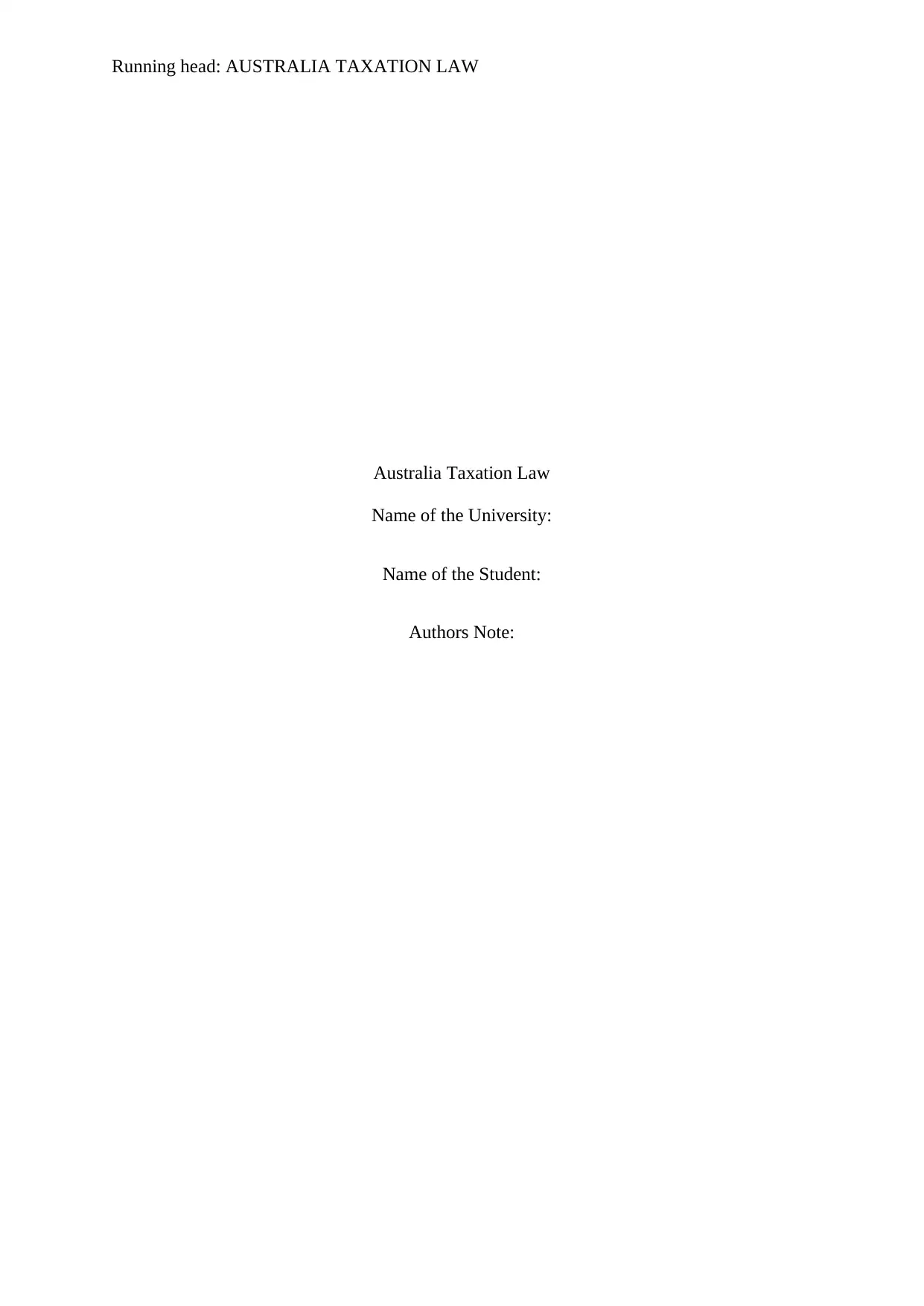
Running head: AUSTRALIA TAXATION LAW
Australia Taxation Law
Name of the University:
Name of the Student:
Authors Note:
Australia Taxation Law
Name of the University:
Name of the Student:
Authors Note:
Paraphrase This Document
Need a fresh take? Get an instant paraphrase of this document with our AI Paraphraser
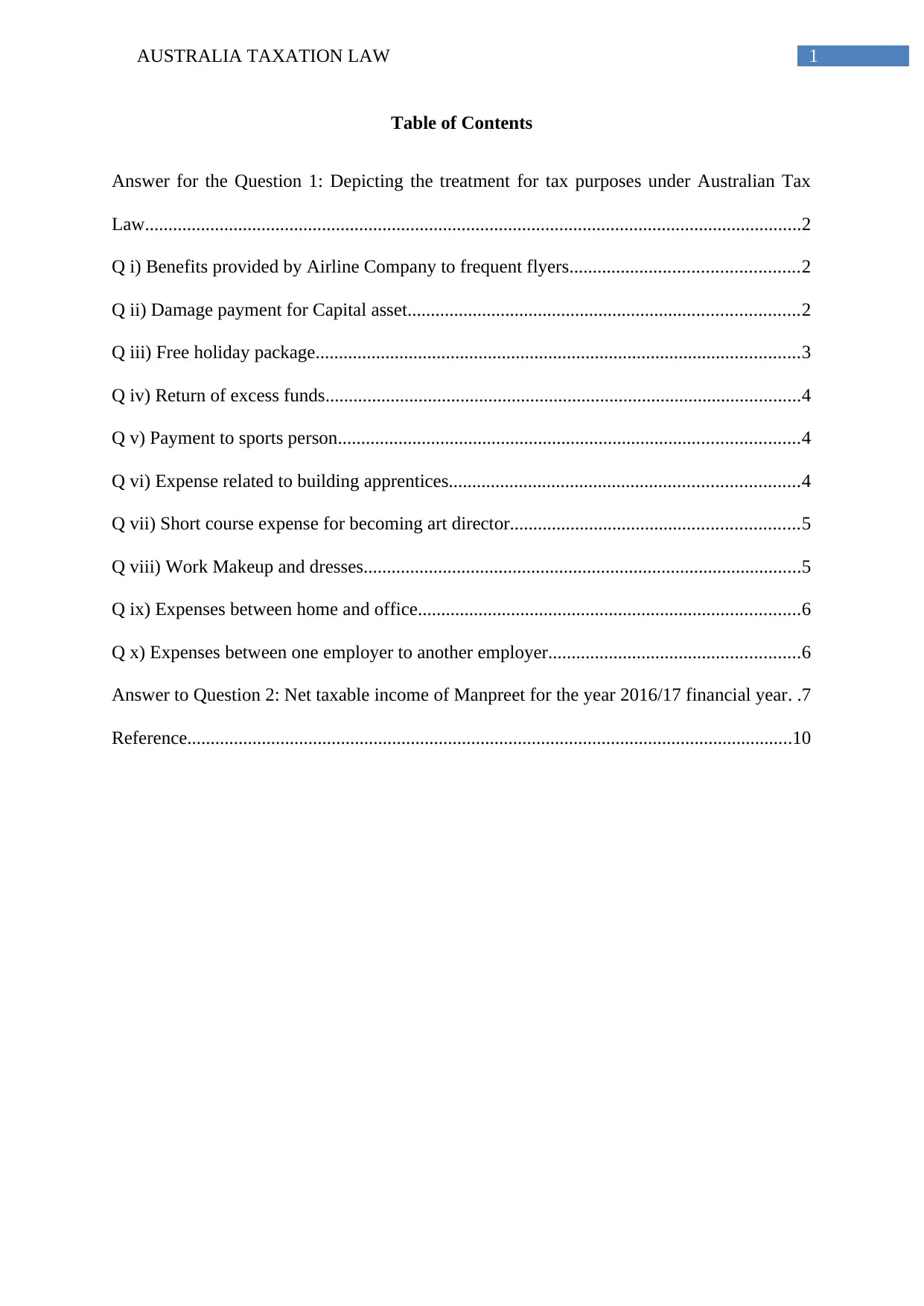
1AUSTRALIA TAXATION LAW
Table of Contents
Answer for the Question 1: Depicting the treatment for tax purposes under Australian Tax
Law.............................................................................................................................................2
Q i) Benefits provided by Airline Company to frequent flyers.................................................2
Q ii) Damage payment for Capital asset....................................................................................2
Q iii) Free holiday package........................................................................................................3
Q iv) Return of excess funds......................................................................................................4
Q v) Payment to sports person...................................................................................................4
Q vi) Expense related to building apprentices...........................................................................4
Q vii) Short course expense for becoming art director..............................................................5
Q viii) Work Makeup and dresses..............................................................................................5
Q ix) Expenses between home and office..................................................................................6
Q x) Expenses between one employer to another employer......................................................6
Answer to Question 2: Net taxable income of Manpreet for the year 2016/17 financial year. .7
Reference..................................................................................................................................10
Table of Contents
Answer for the Question 1: Depicting the treatment for tax purposes under Australian Tax
Law.............................................................................................................................................2
Q i) Benefits provided by Airline Company to frequent flyers.................................................2
Q ii) Damage payment for Capital asset....................................................................................2
Q iii) Free holiday package........................................................................................................3
Q iv) Return of excess funds......................................................................................................4
Q v) Payment to sports person...................................................................................................4
Q vi) Expense related to building apprentices...........................................................................4
Q vii) Short course expense for becoming art director..............................................................5
Q viii) Work Makeup and dresses..............................................................................................5
Q ix) Expenses between home and office..................................................................................6
Q x) Expenses between one employer to another employer......................................................6
Answer to Question 2: Net taxable income of Manpreet for the year 2016/17 financial year. .7
Reference..................................................................................................................................10
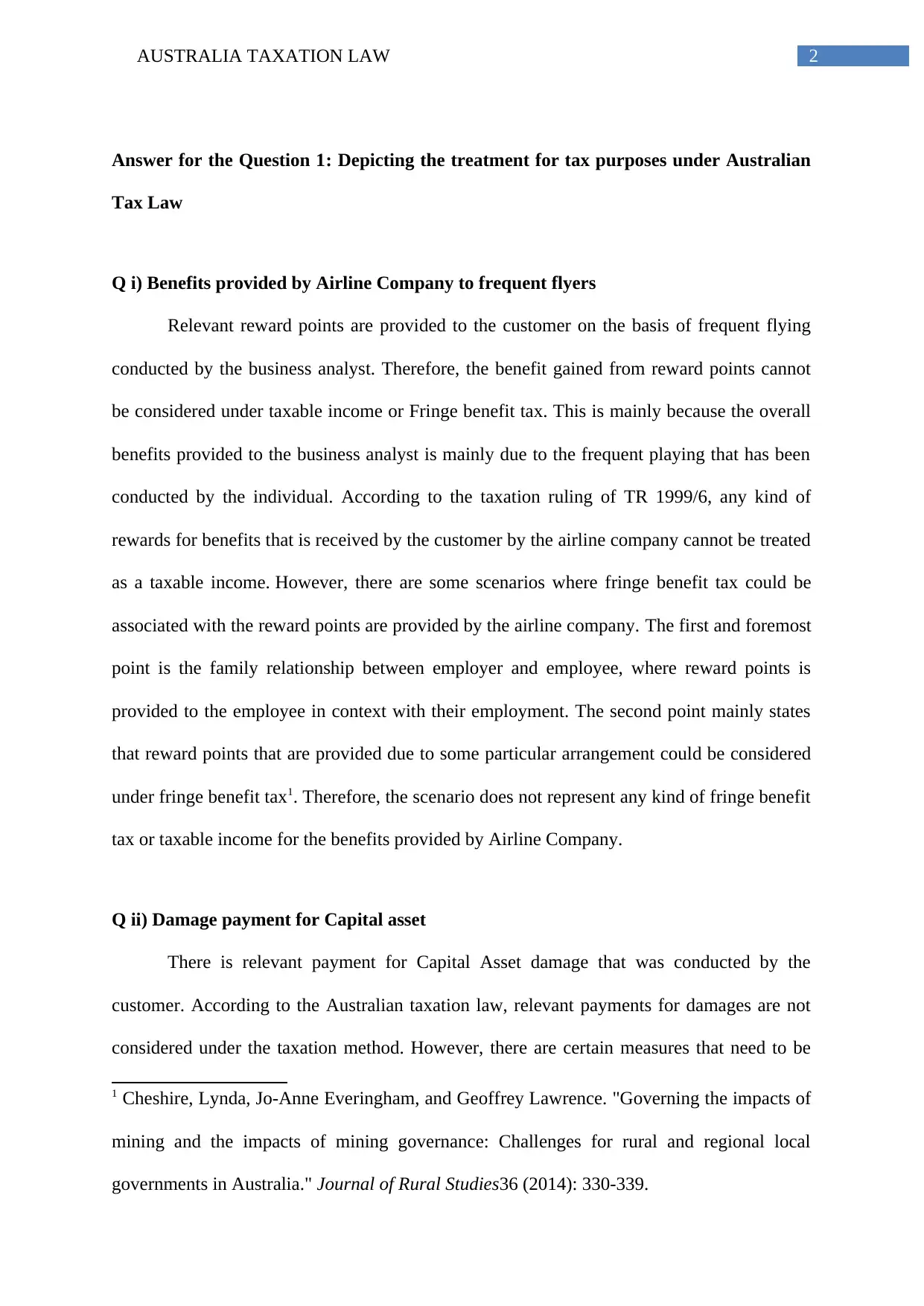
2AUSTRALIA TAXATION LAW
Answer for the Question 1: Depicting the treatment for tax purposes under Australian
Tax Law
Q i) Benefits provided by Airline Company to frequent flyers
Relevant reward points are provided to the customer on the basis of frequent flying
conducted by the business analyst. Therefore, the benefit gained from reward points cannot
be considered under taxable income or Fringe benefit tax. This is mainly because the overall
benefits provided to the business analyst is mainly due to the frequent playing that has been
conducted by the individual. According to the taxation ruling of TR 1999/6, any kind of
rewards for benefits that is received by the customer by the airline company cannot be treated
as a taxable income. However, there are some scenarios where fringe benefit tax could be
associated with the reward points are provided by the airline company. The first and foremost
point is the family relationship between employer and employee, where reward points is
provided to the employee in context with their employment. The second point mainly states
that reward points that are provided due to some particular arrangement could be considered
under fringe benefit tax1. Therefore, the scenario does not represent any kind of fringe benefit
tax or taxable income for the benefits provided by Airline Company.
Q ii) Damage payment for Capital asset
There is relevant payment for Capital Asset damage that was conducted by the
customer. According to the Australian taxation law, relevant payments for damages are not
considered under the taxation method. However, there are certain measures that need to be
1 Cheshire, Lynda, Jo-Anne Everingham, and Geoffrey Lawrence. "Governing the impacts of
mining and the impacts of mining governance: Challenges for rural and regional local
governments in Australia." Journal of Rural Studies36 (2014): 330-339.
Answer for the Question 1: Depicting the treatment for tax purposes under Australian
Tax Law
Q i) Benefits provided by Airline Company to frequent flyers
Relevant reward points are provided to the customer on the basis of frequent flying
conducted by the business analyst. Therefore, the benefit gained from reward points cannot
be considered under taxable income or Fringe benefit tax. This is mainly because the overall
benefits provided to the business analyst is mainly due to the frequent playing that has been
conducted by the individual. According to the taxation ruling of TR 1999/6, any kind of
rewards for benefits that is received by the customer by the airline company cannot be treated
as a taxable income. However, there are some scenarios where fringe benefit tax could be
associated with the reward points are provided by the airline company. The first and foremost
point is the family relationship between employer and employee, where reward points is
provided to the employee in context with their employment. The second point mainly states
that reward points that are provided due to some particular arrangement could be considered
under fringe benefit tax1. Therefore, the scenario does not represent any kind of fringe benefit
tax or taxable income for the benefits provided by Airline Company.
Q ii) Damage payment for Capital asset
There is relevant payment for Capital Asset damage that was conducted by the
customer. According to the Australian taxation law, relevant payments for damages are not
considered under the taxation method. However, there are certain measures that need to be
1 Cheshire, Lynda, Jo-Anne Everingham, and Geoffrey Lawrence. "Governing the impacts of
mining and the impacts of mining governance: Challenges for rural and regional local
governments in Australia." Journal of Rural Studies36 (2014): 330-339.
⊘ This is a preview!⊘
Do you want full access?
Subscribe today to unlock all pages.

Trusted by 1+ million students worldwide
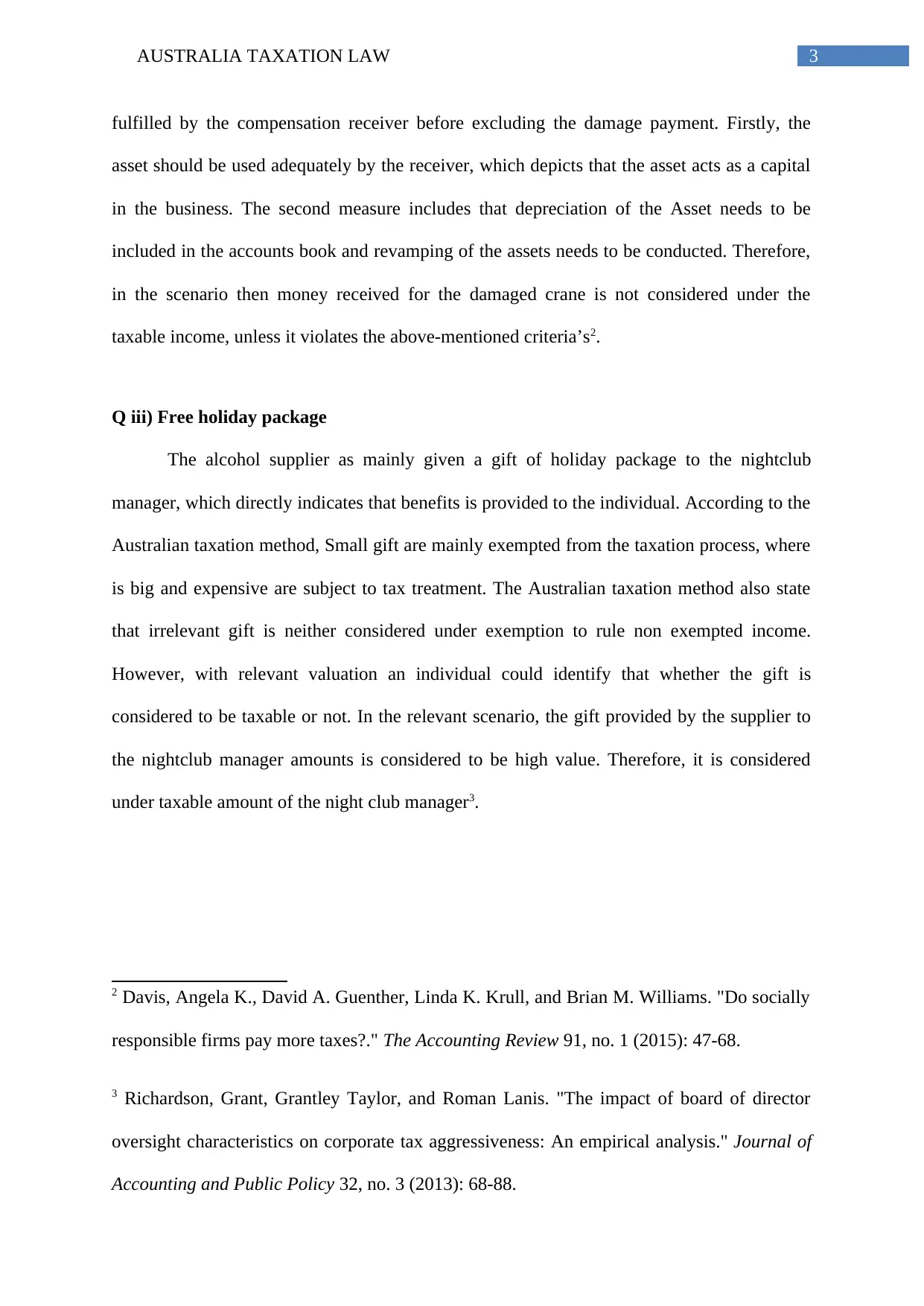
3AUSTRALIA TAXATION LAW
fulfilled by the compensation receiver before excluding the damage payment. Firstly, the
asset should be used adequately by the receiver, which depicts that the asset acts as a capital
in the business. The second measure includes that depreciation of the Asset needs to be
included in the accounts book and revamping of the assets needs to be conducted. Therefore,
in the scenario then money received for the damaged crane is not considered under the
taxable income, unless it violates the above-mentioned criteria’s2.
Q iii) Free holiday package
The alcohol supplier as mainly given a gift of holiday package to the nightclub
manager, which directly indicates that benefits is provided to the individual. According to the
Australian taxation method, Small gift are mainly exempted from the taxation process, where
is big and expensive are subject to tax treatment. The Australian taxation method also state
that irrelevant gift is neither considered under exemption to rule non exempted income.
However, with relevant valuation an individual could identify that whether the gift is
considered to be taxable or not. In the relevant scenario, the gift provided by the supplier to
the nightclub manager amounts is considered to be high value. Therefore, it is considered
under taxable amount of the night club manager3.
2 Davis, Angela K., David A. Guenther, Linda K. Krull, and Brian M. Williams. "Do socially
responsible firms pay more taxes?." The Accounting Review 91, no. 1 (2015): 47-68.
3 Richardson, Grant, Grantley Taylor, and Roman Lanis. "The impact of board of director
oversight characteristics on corporate tax aggressiveness: An empirical analysis." Journal of
Accounting and Public Policy 32, no. 3 (2013): 68-88.
fulfilled by the compensation receiver before excluding the damage payment. Firstly, the
asset should be used adequately by the receiver, which depicts that the asset acts as a capital
in the business. The second measure includes that depreciation of the Asset needs to be
included in the accounts book and revamping of the assets needs to be conducted. Therefore,
in the scenario then money received for the damaged crane is not considered under the
taxable income, unless it violates the above-mentioned criteria’s2.
Q iii) Free holiday package
The alcohol supplier as mainly given a gift of holiday package to the nightclub
manager, which directly indicates that benefits is provided to the individual. According to the
Australian taxation method, Small gift are mainly exempted from the taxation process, where
is big and expensive are subject to tax treatment. The Australian taxation method also state
that irrelevant gift is neither considered under exemption to rule non exempted income.
However, with relevant valuation an individual could identify that whether the gift is
considered to be taxable or not. In the relevant scenario, the gift provided by the supplier to
the nightclub manager amounts is considered to be high value. Therefore, it is considered
under taxable amount of the night club manager3.
2 Davis, Angela K., David A. Guenther, Linda K. Krull, and Brian M. Williams. "Do socially
responsible firms pay more taxes?." The Accounting Review 91, no. 1 (2015): 47-68.
3 Richardson, Grant, Grantley Taylor, and Roman Lanis. "The impact of board of director
oversight characteristics on corporate tax aggressiveness: An empirical analysis." Journal of
Accounting and Public Policy 32, no. 3 (2013): 68-88.
Paraphrase This Document
Need a fresh take? Get an instant paraphrase of this document with our AI Paraphraser
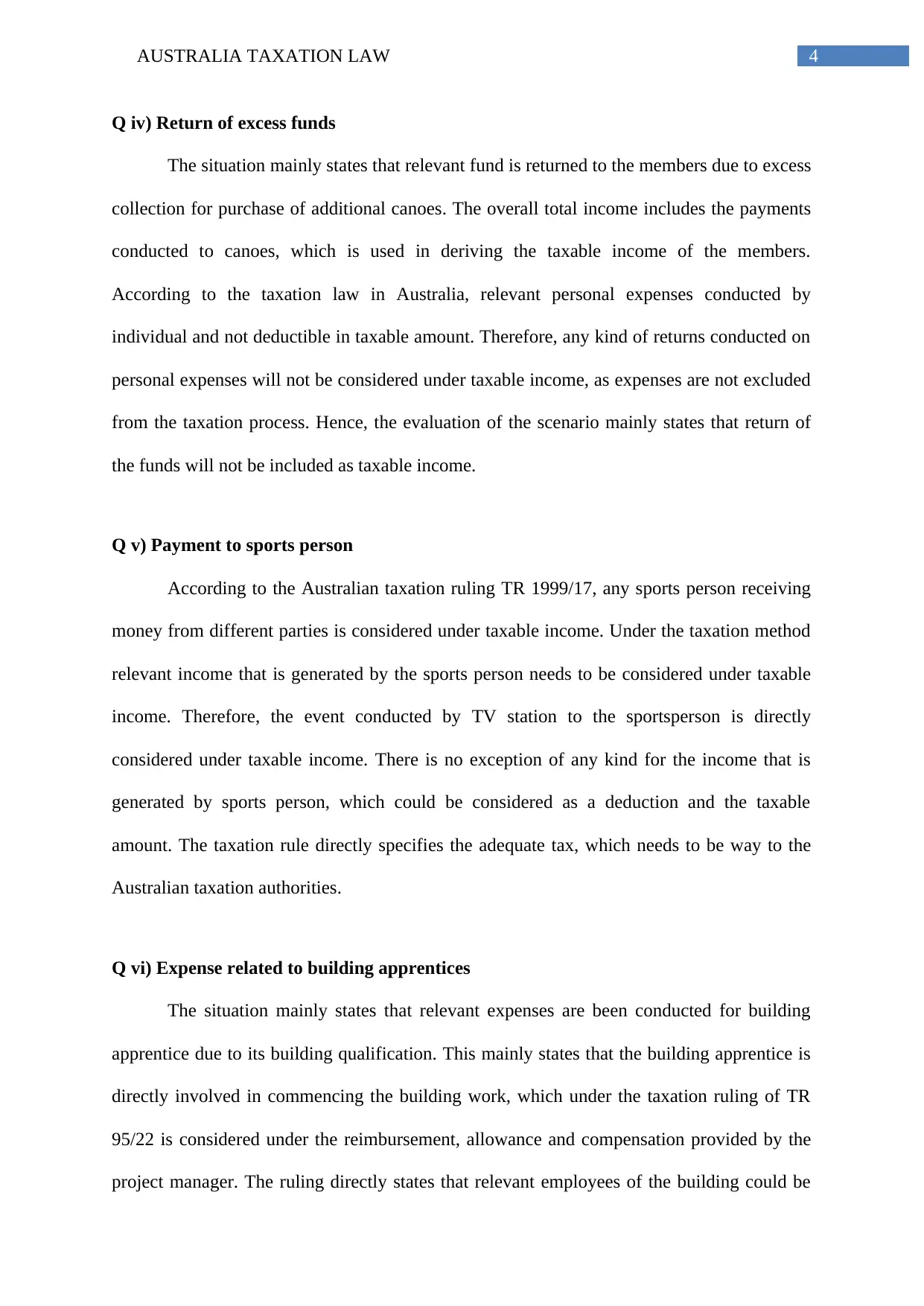
4AUSTRALIA TAXATION LAW
Q iv) Return of excess funds
The situation mainly states that relevant fund is returned to the members due to excess
collection for purchase of additional canoes. The overall total income includes the payments
conducted to canoes, which is used in deriving the taxable income of the members.
According to the taxation law in Australia, relevant personal expenses conducted by
individual and not deductible in taxable amount. Therefore, any kind of returns conducted on
personal expenses will not be considered under taxable income, as expenses are not excluded
from the taxation process. Hence, the evaluation of the scenario mainly states that return of
the funds will not be included as taxable income.
Q v) Payment to sports person
According to the Australian taxation ruling TR 1999/17, any sports person receiving
money from different parties is considered under taxable income. Under the taxation method
relevant income that is generated by the sports person needs to be considered under taxable
income. Therefore, the event conducted by TV station to the sportsperson is directly
considered under taxable income. There is no exception of any kind for the income that is
generated by sports person, which could be considered as a deduction and the taxable
amount. The taxation rule directly specifies the adequate tax, which needs to be way to the
Australian taxation authorities.
Q vi) Expense related to building apprentices
The situation mainly states that relevant expenses are been conducted for building
apprentice due to its building qualification. This mainly states that the building apprentice is
directly involved in commencing the building work, which under the taxation ruling of TR
95/22 is considered under the reimbursement, allowance and compensation provided by the
project manager. The ruling directly states that relevant employees of the building could be
Q iv) Return of excess funds
The situation mainly states that relevant fund is returned to the members due to excess
collection for purchase of additional canoes. The overall total income includes the payments
conducted to canoes, which is used in deriving the taxable income of the members.
According to the taxation law in Australia, relevant personal expenses conducted by
individual and not deductible in taxable amount. Therefore, any kind of returns conducted on
personal expenses will not be considered under taxable income, as expenses are not excluded
from the taxation process. Hence, the evaluation of the scenario mainly states that return of
the funds will not be included as taxable income.
Q v) Payment to sports person
According to the Australian taxation ruling TR 1999/17, any sports person receiving
money from different parties is considered under taxable income. Under the taxation method
relevant income that is generated by the sports person needs to be considered under taxable
income. Therefore, the event conducted by TV station to the sportsperson is directly
considered under taxable income. There is no exception of any kind for the income that is
generated by sports person, which could be considered as a deduction and the taxable
amount. The taxation rule directly specifies the adequate tax, which needs to be way to the
Australian taxation authorities.
Q vi) Expense related to building apprentices
The situation mainly states that relevant expenses are been conducted for building
apprentice due to its building qualification. This mainly states that the building apprentice is
directly involved in commencing the building work, which under the taxation ruling of TR
95/22 is considered under the reimbursement, allowance and compensation provided by the
project manager. The ruling directly states that relevant employees of the building could be
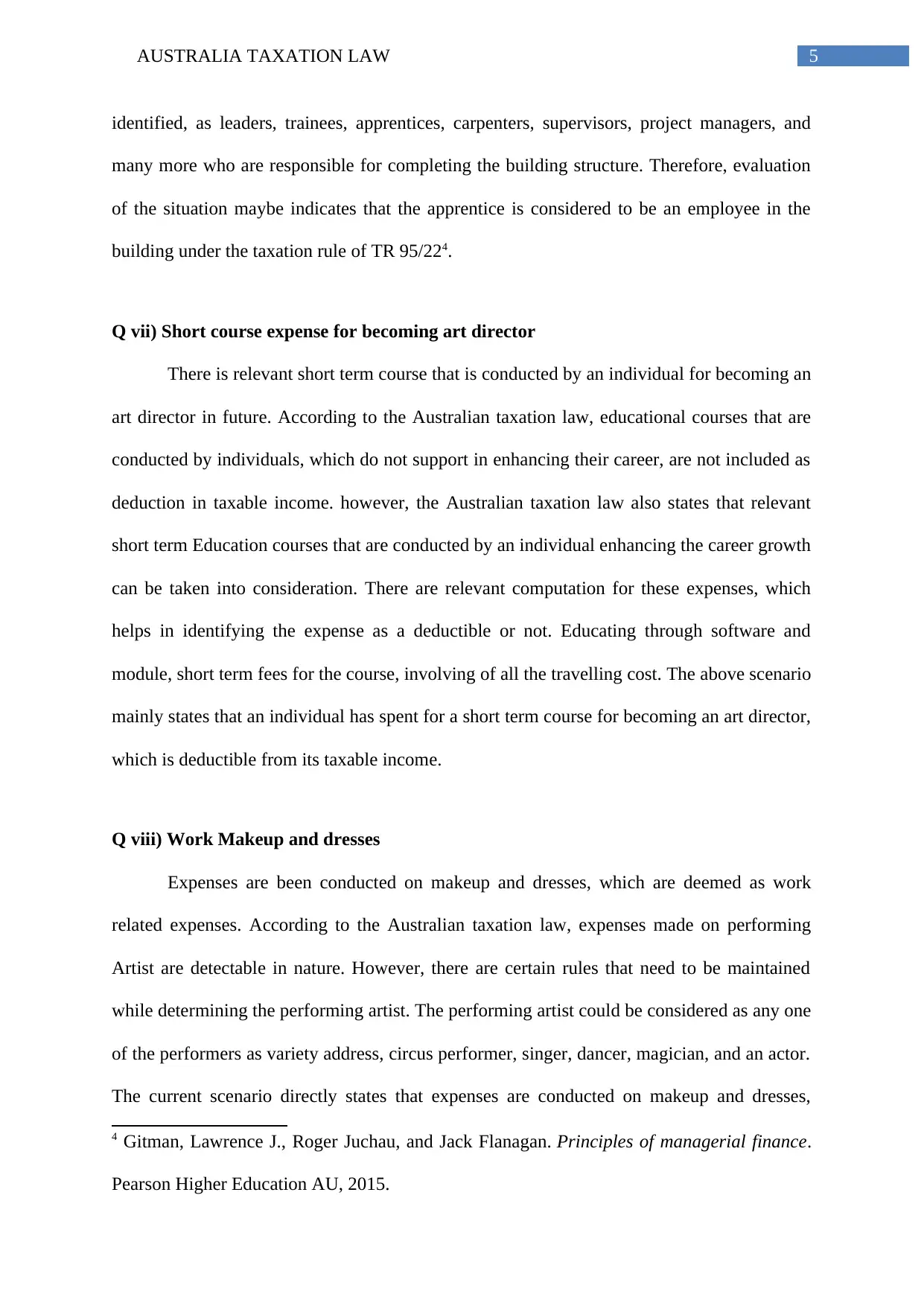
5AUSTRALIA TAXATION LAW
identified, as leaders, trainees, apprentices, carpenters, supervisors, project managers, and
many more who are responsible for completing the building structure. Therefore, evaluation
of the situation maybe indicates that the apprentice is considered to be an employee in the
building under the taxation rule of TR 95/224.
Q vii) Short course expense for becoming art director
There is relevant short term course that is conducted by an individual for becoming an
art director in future. According to the Australian taxation law, educational courses that are
conducted by individuals, which do not support in enhancing their career, are not included as
deduction in taxable income. however, the Australian taxation law also states that relevant
short term Education courses that are conducted by an individual enhancing the career growth
can be taken into consideration. There are relevant computation for these expenses, which
helps in identifying the expense as a deductible or not. Educating through software and
module, short term fees for the course, involving of all the travelling cost. The above scenario
mainly states that an individual has spent for a short term course for becoming an art director,
which is deductible from its taxable income.
Q viii) Work Makeup and dresses
Expenses are been conducted on makeup and dresses, which are deemed as work
related expenses. According to the Australian taxation law, expenses made on performing
Artist are detectable in nature. However, there are certain rules that need to be maintained
while determining the performing artist. The performing artist could be considered as any one
of the performers as variety address, circus performer, singer, dancer, magician, and an actor.
The current scenario directly states that expenses are conducted on makeup and dresses,
4 Gitman, Lawrence J., Roger Juchau, and Jack Flanagan. Principles of managerial finance.
Pearson Higher Education AU, 2015.
identified, as leaders, trainees, apprentices, carpenters, supervisors, project managers, and
many more who are responsible for completing the building structure. Therefore, evaluation
of the situation maybe indicates that the apprentice is considered to be an employee in the
building under the taxation rule of TR 95/224.
Q vii) Short course expense for becoming art director
There is relevant short term course that is conducted by an individual for becoming an
art director in future. According to the Australian taxation law, educational courses that are
conducted by individuals, which do not support in enhancing their career, are not included as
deduction in taxable income. however, the Australian taxation law also states that relevant
short term Education courses that are conducted by an individual enhancing the career growth
can be taken into consideration. There are relevant computation for these expenses, which
helps in identifying the expense as a deductible or not. Educating through software and
module, short term fees for the course, involving of all the travelling cost. The above scenario
mainly states that an individual has spent for a short term course for becoming an art director,
which is deductible from its taxable income.
Q viii) Work Makeup and dresses
Expenses are been conducted on makeup and dresses, which are deemed as work
related expenses. According to the Australian taxation law, expenses made on performing
Artist are detectable in nature. However, there are certain rules that need to be maintained
while determining the performing artist. The performing artist could be considered as any one
of the performers as variety address, circus performer, singer, dancer, magician, and an actor.
The current scenario directly states that expenses are conducted on makeup and dresses,
4 Gitman, Lawrence J., Roger Juchau, and Jack Flanagan. Principles of managerial finance.
Pearson Higher Education AU, 2015.
⊘ This is a preview!⊘
Do you want full access?
Subscribe today to unlock all pages.

Trusted by 1+ million students worldwide
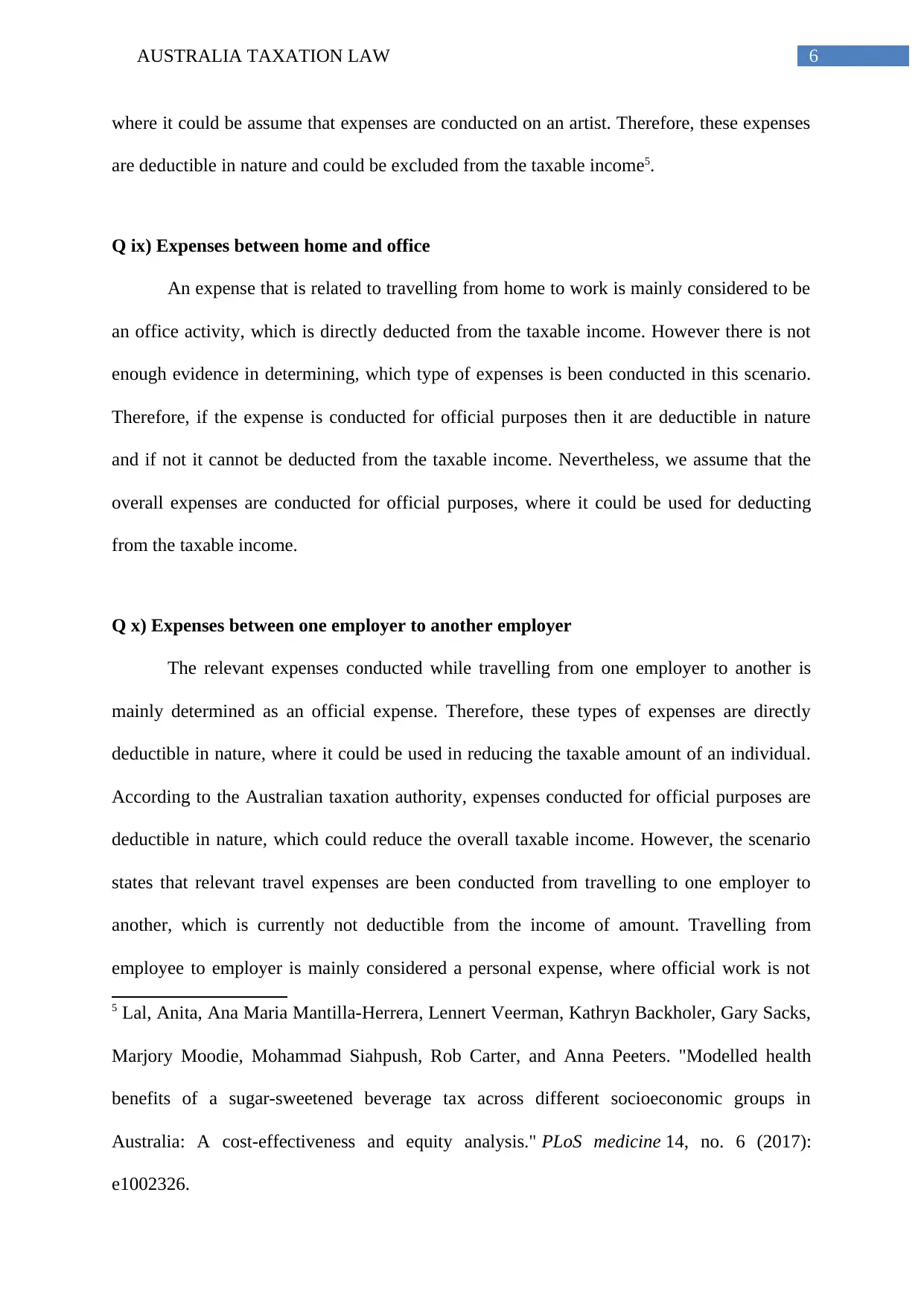
6AUSTRALIA TAXATION LAW
where it could be assume that expenses are conducted on an artist. Therefore, these expenses
are deductible in nature and could be excluded from the taxable income5.
Q ix) Expenses between home and office
An expense that is related to travelling from home to work is mainly considered to be
an office activity, which is directly deducted from the taxable income. However there is not
enough evidence in determining, which type of expenses is been conducted in this scenario.
Therefore, if the expense is conducted for official purposes then it are deductible in nature
and if not it cannot be deducted from the taxable income. Nevertheless, we assume that the
overall expenses are conducted for official purposes, where it could be used for deducting
from the taxable income.
Q x) Expenses between one employer to another employer
The relevant expenses conducted while travelling from one employer to another is
mainly determined as an official expense. Therefore, these types of expenses are directly
deductible in nature, where it could be used in reducing the taxable amount of an individual.
According to the Australian taxation authority, expenses conducted for official purposes are
deductible in nature, which could reduce the overall taxable income. However, the scenario
states that relevant travel expenses are been conducted from travelling to one employer to
another, which is currently not deductible from the income of amount. Travelling from
employee to employer is mainly considered a personal expense, where official work is not
5 Lal, Anita, Ana Maria Mantilla-Herrera, Lennert Veerman, Kathryn Backholer, Gary Sacks,
Marjory Moodie, Mohammad Siahpush, Rob Carter, and Anna Peeters. "Modelled health
benefits of a sugar-sweetened beverage tax across different socioeconomic groups in
Australia: A cost-effectiveness and equity analysis." PLoS medicine 14, no. 6 (2017):
e1002326.
where it could be assume that expenses are conducted on an artist. Therefore, these expenses
are deductible in nature and could be excluded from the taxable income5.
Q ix) Expenses between home and office
An expense that is related to travelling from home to work is mainly considered to be
an office activity, which is directly deducted from the taxable income. However there is not
enough evidence in determining, which type of expenses is been conducted in this scenario.
Therefore, if the expense is conducted for official purposes then it are deductible in nature
and if not it cannot be deducted from the taxable income. Nevertheless, we assume that the
overall expenses are conducted for official purposes, where it could be used for deducting
from the taxable income.
Q x) Expenses between one employer to another employer
The relevant expenses conducted while travelling from one employer to another is
mainly determined as an official expense. Therefore, these types of expenses are directly
deductible in nature, where it could be used in reducing the taxable amount of an individual.
According to the Australian taxation authority, expenses conducted for official purposes are
deductible in nature, which could reduce the overall taxable income. However, the scenario
states that relevant travel expenses are been conducted from travelling to one employer to
another, which is currently not deductible from the income of amount. Travelling from
employee to employer is mainly considered a personal expense, where official work is not
5 Lal, Anita, Ana Maria Mantilla-Herrera, Lennert Veerman, Kathryn Backholer, Gary Sacks,
Marjory Moodie, Mohammad Siahpush, Rob Carter, and Anna Peeters. "Modelled health
benefits of a sugar-sweetened beverage tax across different socioeconomic groups in
Australia: A cost-effectiveness and equity analysis." PLoS medicine 14, no. 6 (2017):
e1002326.
Paraphrase This Document
Need a fresh take? Get an instant paraphrase of this document with our AI Paraphraser
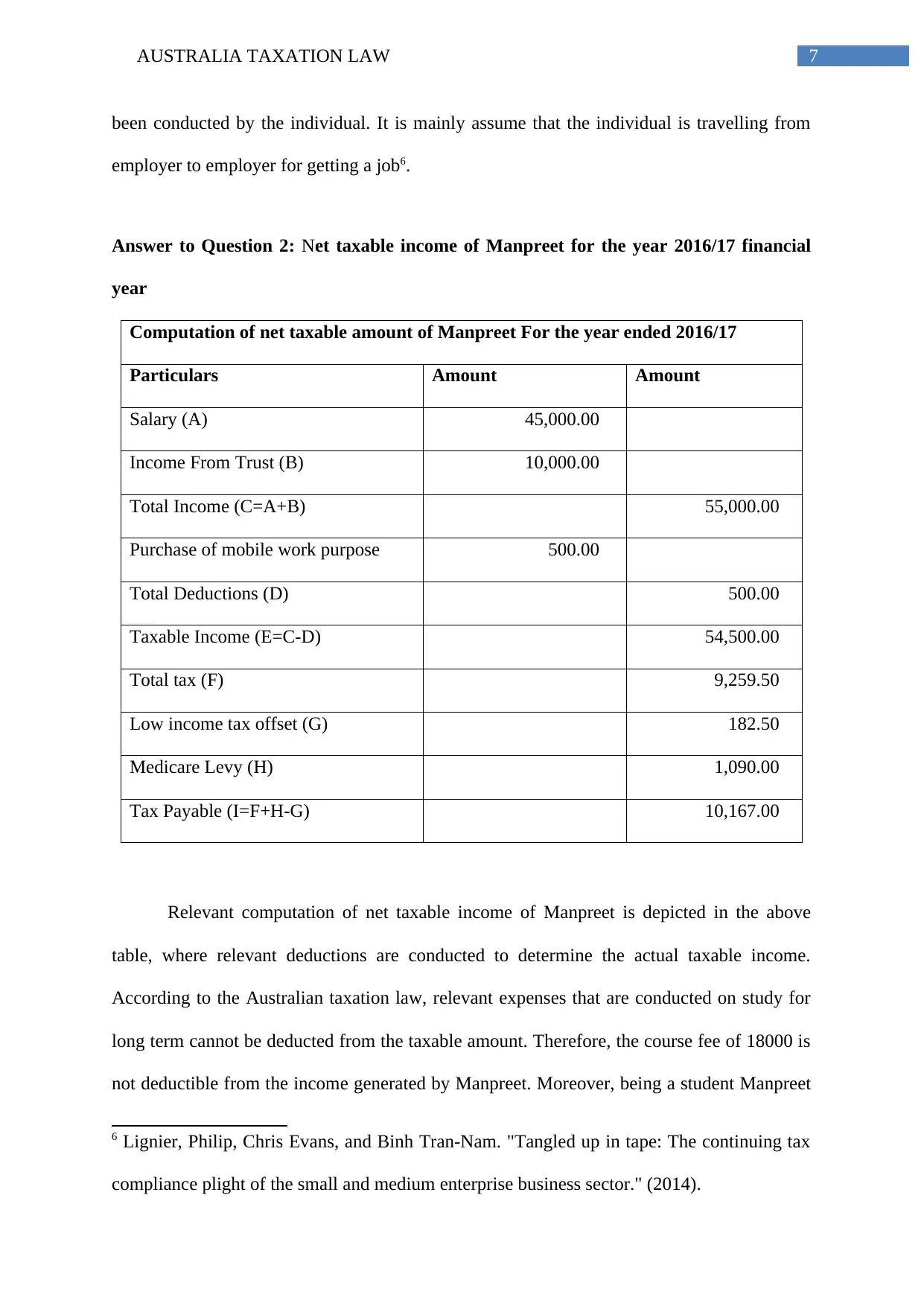
7AUSTRALIA TAXATION LAW
been conducted by the individual. It is mainly assume that the individual is travelling from
employer to employer for getting a job6.
Answer to Question 2: Net taxable income of Manpreet for the year 2016/17 financial
year
Computation of net taxable amount of Manpreet For the year ended 2016/17
Particulars Amount Amount
Salary (A) 45,000.00
Income From Trust (B) 10,000.00
Total Income (C=A+B) 55,000.00
Purchase of mobile work purpose 500.00
Total Deductions (D) 500.00
Taxable Income (E=C-D) 54,500.00
Total tax (F) 9,259.50
Low income tax offset (G) 182.50
Medicare Levy (H) 1,090.00
Tax Payable (I=F+H-G) 10,167.00
Relevant computation of net taxable income of Manpreet is depicted in the above
table, where relevant deductions are conducted to determine the actual taxable income.
According to the Australian taxation law, relevant expenses that are conducted on study for
long term cannot be deducted from the taxable amount. Therefore, the course fee of 18000 is
not deductible from the income generated by Manpreet. Moreover, being a student Manpreet
6 Lignier, Philip, Chris Evans, and Binh Tran-Nam. "Tangled up in tape: The continuing tax
compliance plight of the small and medium enterprise business sector." (2014).
been conducted by the individual. It is mainly assume that the individual is travelling from
employer to employer for getting a job6.
Answer to Question 2: Net taxable income of Manpreet for the year 2016/17 financial
year
Computation of net taxable amount of Manpreet For the year ended 2016/17
Particulars Amount Amount
Salary (A) 45,000.00
Income From Trust (B) 10,000.00
Total Income (C=A+B) 55,000.00
Purchase of mobile work purpose 500.00
Total Deductions (D) 500.00
Taxable Income (E=C-D) 54,500.00
Total tax (F) 9,259.50
Low income tax offset (G) 182.50
Medicare Levy (H) 1,090.00
Tax Payable (I=F+H-G) 10,167.00
Relevant computation of net taxable income of Manpreet is depicted in the above
table, where relevant deductions are conducted to determine the actual taxable income.
According to the Australian taxation law, relevant expenses that are conducted on study for
long term cannot be deducted from the taxable amount. Therefore, the course fee of 18000 is
not deductible from the income generated by Manpreet. Moreover, being a student Manpreet
6 Lignier, Philip, Chris Evans, and Binh Tran-Nam. "Tangled up in tape: The continuing tax
compliance plight of the small and medium enterprise business sector." (2014).
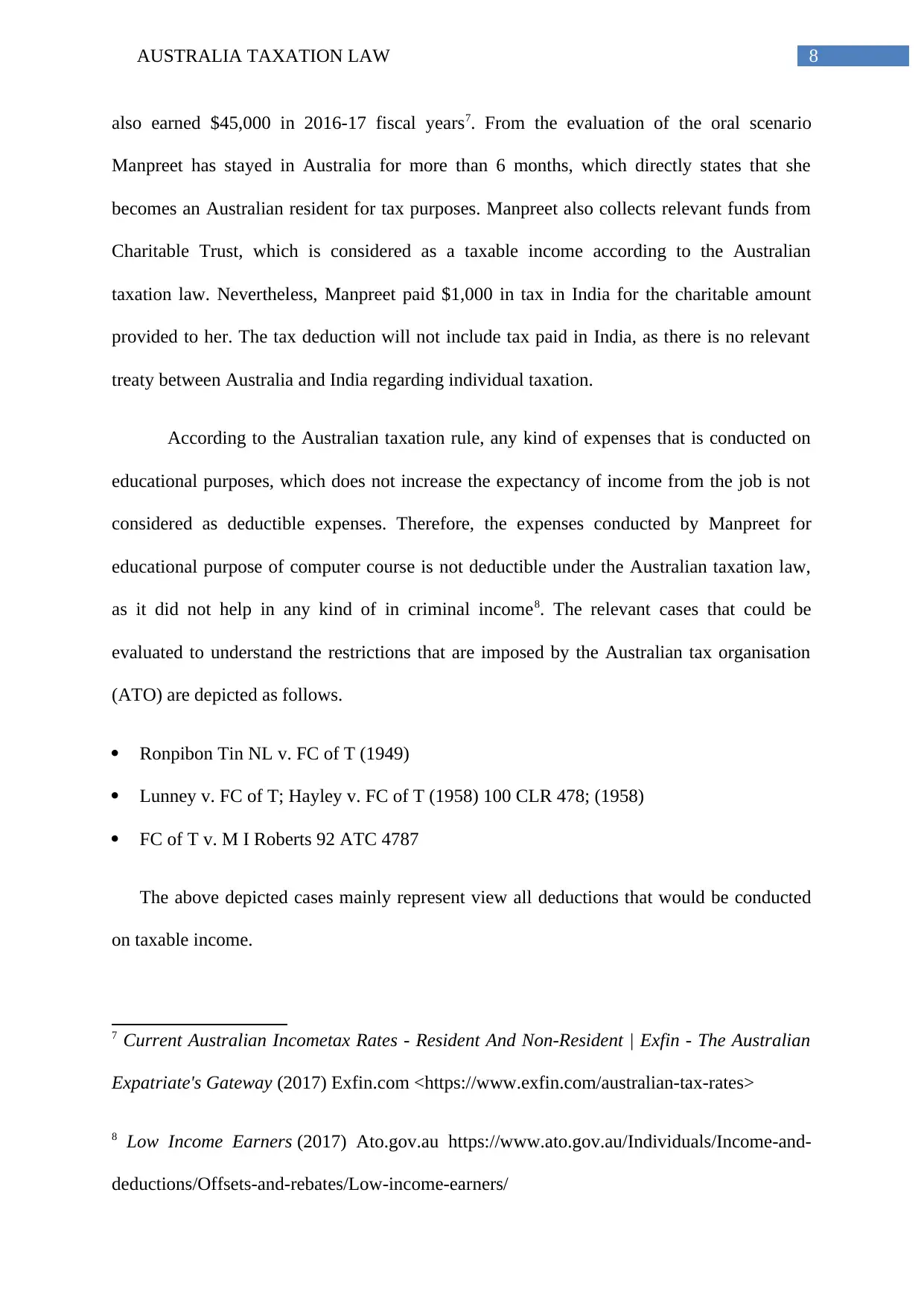
8AUSTRALIA TAXATION LAW
also earned $45,000 in 2016-17 fiscal years7. From the evaluation of the oral scenario
Manpreet has stayed in Australia for more than 6 months, which directly states that she
becomes an Australian resident for tax purposes. Manpreet also collects relevant funds from
Charitable Trust, which is considered as a taxable income according to the Australian
taxation law. Nevertheless, Manpreet paid $1,000 in tax in India for the charitable amount
provided to her. The tax deduction will not include tax paid in India, as there is no relevant
treaty between Australia and India regarding individual taxation.
According to the Australian taxation rule, any kind of expenses that is conducted on
educational purposes, which does not increase the expectancy of income from the job is not
considered as deductible expenses. Therefore, the expenses conducted by Manpreet for
educational purpose of computer course is not deductible under the Australian taxation law,
as it did not help in any kind of in criminal income8. The relevant cases that could be
evaluated to understand the restrictions that are imposed by the Australian tax organisation
(ATO) are depicted as follows.
Ronpibon Tin NL v. FC of T (1949)
Lunney v. FC of T; Hayley v. FC of T (1958) 100 CLR 478; (1958)
FC of T v. M I Roberts 92 ATC 4787
The above depicted cases mainly represent view all deductions that would be conducted
on taxable income.
7 Current Australian Incometax Rates - Resident And Non-Resident | Exfin - The Australian
Expatriate's Gateway (2017) Exfin.com <https://www.exfin.com/australian-tax-rates>
8 Low Income Earners (2017) Ato.gov.au https://www.ato.gov.au/Individuals/Income-and-
deductions/Offsets-and-rebates/Low-income-earners/
also earned $45,000 in 2016-17 fiscal years7. From the evaluation of the oral scenario
Manpreet has stayed in Australia for more than 6 months, which directly states that she
becomes an Australian resident for tax purposes. Manpreet also collects relevant funds from
Charitable Trust, which is considered as a taxable income according to the Australian
taxation law. Nevertheless, Manpreet paid $1,000 in tax in India for the charitable amount
provided to her. The tax deduction will not include tax paid in India, as there is no relevant
treaty between Australia and India regarding individual taxation.
According to the Australian taxation rule, any kind of expenses that is conducted on
educational purposes, which does not increase the expectancy of income from the job is not
considered as deductible expenses. Therefore, the expenses conducted by Manpreet for
educational purpose of computer course is not deductible under the Australian taxation law,
as it did not help in any kind of in criminal income8. The relevant cases that could be
evaluated to understand the restrictions that are imposed by the Australian tax organisation
(ATO) are depicted as follows.
Ronpibon Tin NL v. FC of T (1949)
Lunney v. FC of T; Hayley v. FC of T (1958) 100 CLR 478; (1958)
FC of T v. M I Roberts 92 ATC 4787
The above depicted cases mainly represent view all deductions that would be conducted
on taxable income.
7 Current Australian Incometax Rates - Resident And Non-Resident | Exfin - The Australian
Expatriate's Gateway (2017) Exfin.com <https://www.exfin.com/australian-tax-rates>
8 Low Income Earners (2017) Ato.gov.au https://www.ato.gov.au/Individuals/Income-and-
deductions/Offsets-and-rebates/Low-income-earners/
⊘ This is a preview!⊘
Do you want full access?
Subscribe today to unlock all pages.

Trusted by 1+ million students worldwide
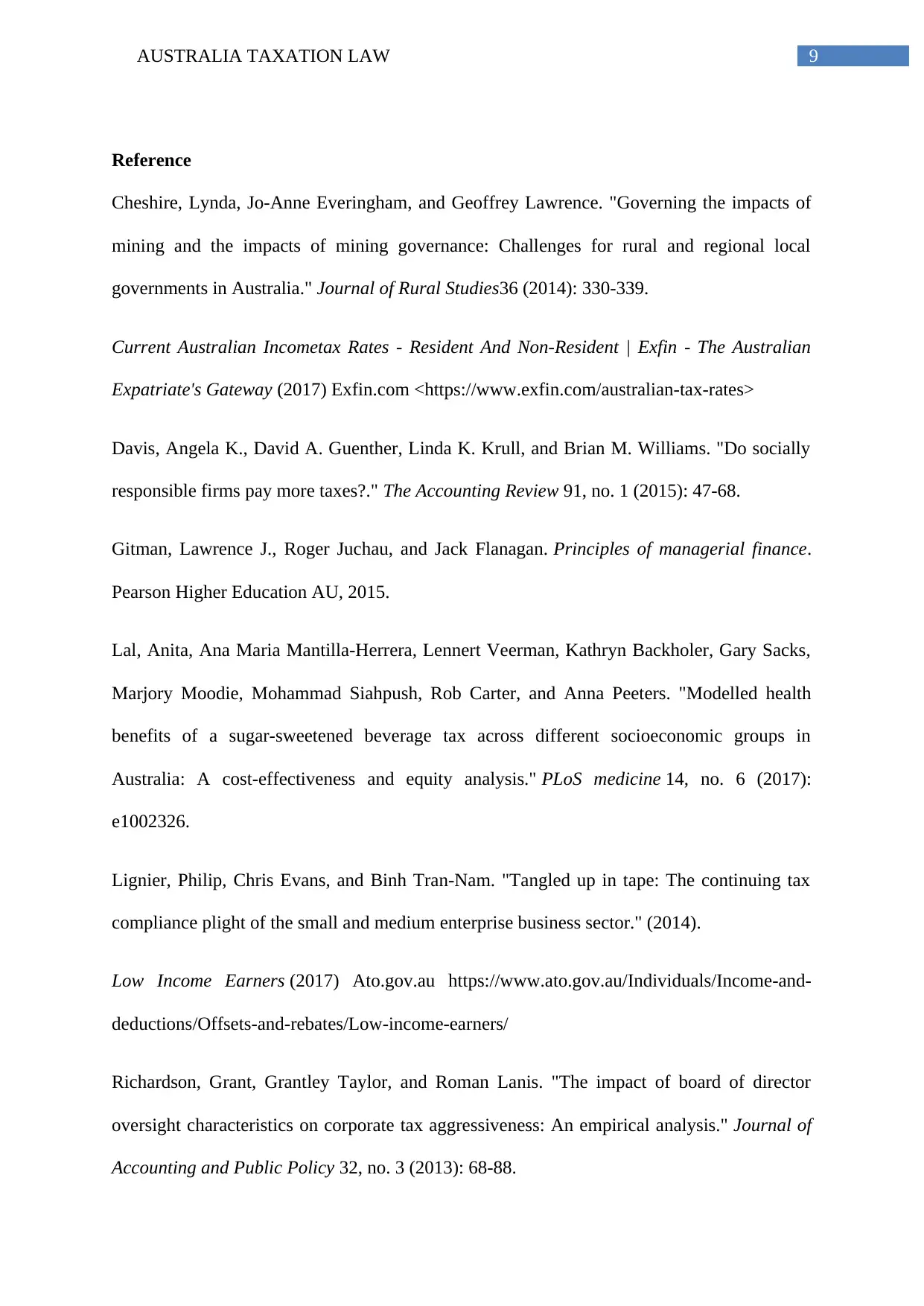
9AUSTRALIA TAXATION LAW
Reference
Cheshire, Lynda, Jo-Anne Everingham, and Geoffrey Lawrence. "Governing the impacts of
mining and the impacts of mining governance: Challenges for rural and regional local
governments in Australia." Journal of Rural Studies36 (2014): 330-339.
Current Australian Incometax Rates - Resident And Non-Resident | Exfin - The Australian
Expatriate's Gateway (2017) Exfin.com <https://www.exfin.com/australian-tax-rates>
Davis, Angela K., David A. Guenther, Linda K. Krull, and Brian M. Williams. "Do socially
responsible firms pay more taxes?." The Accounting Review 91, no. 1 (2015): 47-68.
Gitman, Lawrence J., Roger Juchau, and Jack Flanagan. Principles of managerial finance.
Pearson Higher Education AU, 2015.
Lal, Anita, Ana Maria Mantilla-Herrera, Lennert Veerman, Kathryn Backholer, Gary Sacks,
Marjory Moodie, Mohammad Siahpush, Rob Carter, and Anna Peeters. "Modelled health
benefits of a sugar-sweetened beverage tax across different socioeconomic groups in
Australia: A cost-effectiveness and equity analysis." PLoS medicine 14, no. 6 (2017):
e1002326.
Lignier, Philip, Chris Evans, and Binh Tran-Nam. "Tangled up in tape: The continuing tax
compliance plight of the small and medium enterprise business sector." (2014).
Low Income Earners (2017) Ato.gov.au https://www.ato.gov.au/Individuals/Income-and-
deductions/Offsets-and-rebates/Low-income-earners/
Richardson, Grant, Grantley Taylor, and Roman Lanis. "The impact of board of director
oversight characteristics on corporate tax aggressiveness: An empirical analysis." Journal of
Accounting and Public Policy 32, no. 3 (2013): 68-88.
Reference
Cheshire, Lynda, Jo-Anne Everingham, and Geoffrey Lawrence. "Governing the impacts of
mining and the impacts of mining governance: Challenges for rural and regional local
governments in Australia." Journal of Rural Studies36 (2014): 330-339.
Current Australian Incometax Rates - Resident And Non-Resident | Exfin - The Australian
Expatriate's Gateway (2017) Exfin.com <https://www.exfin.com/australian-tax-rates>
Davis, Angela K., David A. Guenther, Linda K. Krull, and Brian M. Williams. "Do socially
responsible firms pay more taxes?." The Accounting Review 91, no. 1 (2015): 47-68.
Gitman, Lawrence J., Roger Juchau, and Jack Flanagan. Principles of managerial finance.
Pearson Higher Education AU, 2015.
Lal, Anita, Ana Maria Mantilla-Herrera, Lennert Veerman, Kathryn Backholer, Gary Sacks,
Marjory Moodie, Mohammad Siahpush, Rob Carter, and Anna Peeters. "Modelled health
benefits of a sugar-sweetened beverage tax across different socioeconomic groups in
Australia: A cost-effectiveness and equity analysis." PLoS medicine 14, no. 6 (2017):
e1002326.
Lignier, Philip, Chris Evans, and Binh Tran-Nam. "Tangled up in tape: The continuing tax
compliance plight of the small and medium enterprise business sector." (2014).
Low Income Earners (2017) Ato.gov.au https://www.ato.gov.au/Individuals/Income-and-
deductions/Offsets-and-rebates/Low-income-earners/
Richardson, Grant, Grantley Taylor, and Roman Lanis. "The impact of board of director
oversight characteristics on corporate tax aggressiveness: An empirical analysis." Journal of
Accounting and Public Policy 32, no. 3 (2013): 68-88.
1 out of 10
Related Documents
Your All-in-One AI-Powered Toolkit for Academic Success.
+13062052269
info@desklib.com
Available 24*7 on WhatsApp / Email
![[object Object]](/_next/static/media/star-bottom.7253800d.svg)
Unlock your academic potential
Copyright © 2020–2026 A2Z Services. All Rights Reserved. Developed and managed by ZUCOL.





